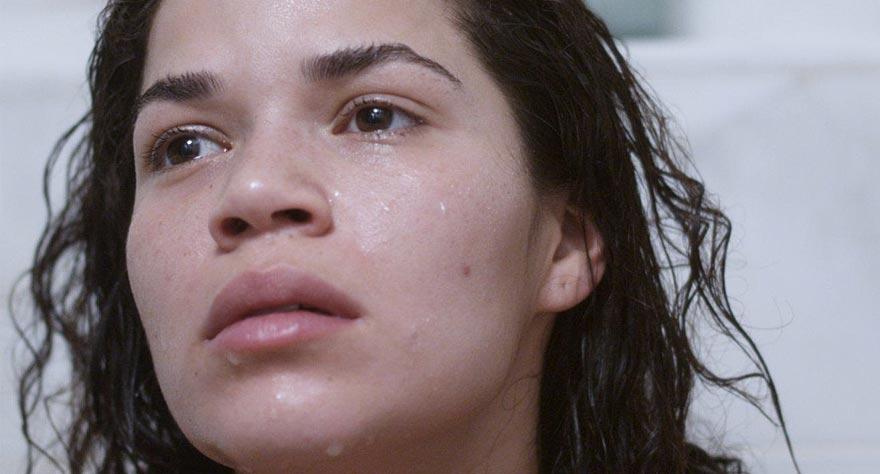
A relatable look at emotional connection and need, though not as lofty as the filmmaker might have hoped.

A relatable look at emotional connection and need, though not as lofty as the filmmaker might have hoped.
Sometimes going into a film with zero foreknowledge allows for a deeper understanding and more open viewing experience. It also means that one’s gut reaction is going to end up being the overall feeling one’s left with. My gut reaction after a cold-viewing of Ryan Piers Williams’ X/Y was that the movie felt like it was written as a vehicle for an under the radar filmmaker to give himself the spotlight. Almost immediately after having this thought Williams’ name appeared on the screen declaring him director, writer, and star. I think I laughed out loud. The film’s press notes (which I read later) describe it as a snapshot of a few New Yorkers caught between generation X and Y. This seems dubious. Williams’ motivations in making a film he and his wife, America Ferrera, could star in surrounding emotional intimacy among urban young folk seems to fall squarely into generation Y. And believe me when I say, I’m not faulting him for it. It’s the rally cry of the Millennial generation that if they see a hole in the world, they set out to fill it. Williams has created an insightful, if maybe unflattering, view of his peers, in a film that is expertly crafted and performed.
Williams stars as Mark and the film opens on him and his girlfriend Sylvia (Ferrera) having particularly sad sex. Their connection is fraying, proven when the disappointing sex turns to a full-blown fight. In their next scene Sylvia admits to having cheated on Mark out of loneliness and his emotional distance. Mark leaves, eventually landing on his friend Jake’s (Jon Paul Phillips) couch. The film then splits into four sections. First Mark, who’s arguing with his agent about the direction of his screenplay and not wanting to sell out for a studio deal (another distinctly gen Y trait of artistic integrity over a solid paycheck.) At night he parties with Jake and their friend Stacey (Amber Tamblyn) with whom he flirts, but who he soon realizes has her own relationship problems back at home.
Next up is Jen (Melonie Diaz), recently unemployed and best friend to Sylvia. The two get together for some spa pampering and gossip, Jen rambling on without ceasing about all the latest men in her life. Sylvia endures it until her own news comes out about her and Mark’s separation. Jen does what most single girls baffled by their happy friends’ behavior would do: she immediately criticizes Sylvia telling her to make it right. Sylvia denounces Jen’s advice on the basis of her own love-life being a joke. Hurt, Jen takes off for a shopping spree to soothe her hurt feelings but first swings by last night’s hook-up to pick up a bag she left. His wife answers the door. She buys bags of clothing, taking them home to her already overflowing apartment, the emotional metaphor all too obvious.
Jake is the focus of the next segment, starting with sex in a dirty club bathroom with a stranger. He dumps her unceremoniously onto the floor after, taking off without a word. A model and artist, Jake still struggles from a semi-recent break-up, unable even to appreciate the advances of a nice girl he meets at a photo shoot. Desperate (as each of these characters are) for a connection, Jake pushes boundaries with a close friend, both of them giving in if only to feel desired.
Sylvia acts on her own feelings of need in her segment (which of course also starts mid-sexual encounter, which all of the segments do in some way or other), keeping up an affair with co-worker Jason (Common), the one she cheated on Mark with. It becomes obvious to her the relationship is purely sexual, and she needs to choose if she can live with that. Meanwhile, her edge at work is waning as she gets more and more distracted by her problems at home.
As I said before, Williams may have made the film as a vehicle for his own talents, but because he clearly has talent, it’s hard to hold this against him. The film’s writing focuses on the more negative aspects of relational difficulty, and as all the characters are close-knit friends, it does give off the impression that no one is happy anywhere. The film’s NYC location is obvious but not essential to the story, though Williams’ story is distinctly centered around the urban experience.
The thumping music and large lettered title cards distributed throughout X/Y are distinctly GIRLS-like, another argument for its gen-Y status as it is emulating the most Millennial show out there. But arguments for what generation the characters belong to aside, what Williams and his press team should have said about X/Y’s title is that it represents the chromosomes that make up people. And that people need each other, and there are ways in which that need leads us to hurt each other and ourselves. That truth transcends generational categories.
Williams and Ferrera (who produced) make a great team and have created a relatable, albeit one-sided, look at not only a group of young people, but at a basic human condition. It’s the character’s response to this condition that makes the film interesting, but it’s their assumption that this is somehow harder for them or a problem more unique to their generation that keeps the film from having true depth. It’s not harder, it’s not unique, it’s all part of being human. But maybe we just talk about it more, in which case I hope making this film proved truly therapeutic for Williams and company.
X/Y is out in theaters and on VOD March 6.